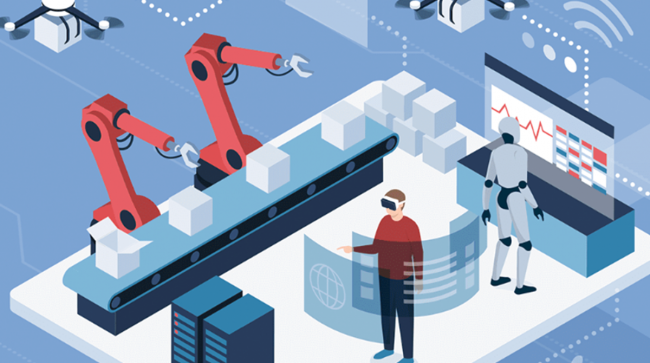
Dr. John C. Cavanaugh is President and CEO of the Consortium of Universities of the Washington Metropolitan Area. Previously, he served as Chancellor of the Pennsylvania State System of Higher Education and as president of the University of West Florida. John is a leader in higher education policy and innovation, as well as for innovative uses of technology. He has led statutory and regulatory reform of higher education, and is a national leader on quality assurance and accreditation. His disciplinary expertise is in gerontology and neuroscience. John earned his B.A. in psychology with high honors from the University of Delaware, and his M.A and Ph.D. in psychology from the University of Notre Dame.
Topics
Who is Responsible for Skills Building: Interview with John Cavanaugh

Our latest survey, 2020 CGS Emerging Workplace Learning Trends Survey, 1,000 employees reveal that in the midst of digital transformation and automation, college is still seen as valuable, but there are major gaps in future skills development.
As companies, universities, government entities and employees prepare to address the necessary skills of the future, we shared the findings to initiate conversations with a few of the brightest minds and thought leaders on this topic. In our second interview in this series, we spoke with John Cavanaugh, President & CEO at Consortium of Universities of the Washington Metropolitan Area.
In this Q&A, he shares his thoughts on defining the term “skills gap,” learning-to-learn and the need for deeper partnerships between business and academia.
Who is responsible for skills building (employee, companies, academia and/or government)? And, with such technological advancements as AI, automation and machine learning, has your position on this changed recently?
The responsibility lies across all four. No one sector can possibly provide everything for everyone. It has to be a partnership based in deep collaboration.
Companies need to disaggregate the specific skills they say they need, ideally into "immediately upon hire" and "later"; and then decide which skills are proprietary and which are not. From there, discussions can proceed. For example, all proprietary skills would need to be handled by the business or through a very narrow agreement with a provider. More generic skills could be better handled by postsecondary institutions. But it MUST start with a full and deep understanding of what the skills really are.
As President and CEO of the Consortium of Universities, what innovations or changes in higher education do you see forthcoming to better ensure students are prepared for the changing workforce?
If all you focus on are the skills to get you the first job, then you will be in very deep trouble. The highest needs I consistently hear from C-Suite folks are the flexible skills that one acquires from a broad education. Among those, learning-to-learn is arguably the most critical.
Much of this is through focused liberal arts/general education. For details on a good model, please see here (https://www.aacu.org/leap) for a general overview and here (https://www.aacu.org/value-rubrics) for specific learning outcomes. From these sites you can follow specific topics such as critical thinking. All of these feed into learning-to-learn.
Are there any government-driven policies proposed or passed in last few years that you believe will help the U.S. close the skills gap?
First, I contend that we do not have a clear definition or understanding of the term "skills gap." There is a serious disconnect between the C-Suite and the front-line HR hiring staff on this. To some, the "skills gap" means that you cannot walk into a sophisticated manufacturing plant and operate a proprietary robotic device. To others, it means you cannot integrate complex data from multiple sources quickly and creatively. Until we have clear agreement on what we are talking about, there is no "solution" because we do not have a clear "problem" to solve.
What input from the business world will be critical to universities in helping prepare the next generation of workers?
The most important thing is to have business and academia talking from the same sheet in terms of what we mean by "skills" and "jobs." When that happens, what emerges are excellent partnerships that address educated workforce needs at ALL levels. For instance, arguably the biggest need in the DC area right now are people with graduate-level knowledge in both a content area and in management of people/budget/finance.
How can workers influence legislation to ensure career development is considered?
Actually, we are doing pretty well there. Congress has supported tax credits for both individuals and companies for education and training. Continued support of those programs and incentives would be great.
Do you think reskilling initiatives like those announced by AT&T, JPMorgan Chase and Amazon will be successful?
Reskilling is not a new concept; the label has just been changed. For much of the 20th century, companies provided LOTS of in-house training and development to ensure that their employees kept current and were retained. In the late 20th century, much of that stopped and was outsourced. Now, the new iteration is a combination of in-house proprietary training and partnerships with higher education institutions. So, yes, it will work, and work well.
49.6% of the respondents to our survey state that college has generally made them well or extremely well prepared for their work. The data shows that respondents feel that college is worthwhile, but the valuable skills attained are soft skills – problem solving, critical thinking, leadership skills. Only 33.8% of respondents say that college provided them with specific expertise applicable to their jobs. And, only 24% state that college provided them with technical skills that are applicable to their jobs. What’s your reaction to these results? Should colleges be responsible for more of the skills needed to transition to the workforce? Why or Why not?
It's hardly surprising that college does not prepare people for a very specific job. That's not what a bachelor's degree is designed to do. If you want that kind of highly specific training, then one needs to attend a program specifically designed by that company for that very defined job. The point of the bachelor's degree is to provide a strong foundation on which to build, a foundation that provides the soft skills and intellectual skills needed to be flexible and nimble as a learner, in order to be able to move across jobs and advance in one's career. If all I ever learn was one specific version of Python, for instance, and not how to adapt to the fact that Python will change, and change quickly over time, then I quickly become obsolete. However, if I have really acquired the flexible skills, then I will not. As I have noted earlier, no single sector (higher ed, the learner, government or business) can possibly be 100% responsible for teaching every variation of every entry level job. It has to be a partnership.
We asked survey participants: “You jump into a time machine; with your current knowledge, if you pursued a college education now, which external factors would affect your career choice? Select three.” Respondents answered:
- 43.8% would heavily factor the ever-changing skills required in choosing a college education and career path if they were to do it all again
- 41.7% would be most concerned about the cost of college
- 26.5% would be most concerned about the tight job market.
Reviewing these considerations, what is your take on preparing current and future generations for the emerging work environment?
We must do a better job at providing advice on the optimal match between cost and the flexible skills needed. And, have the C-Suite do more of the talking.
Job titles and defined roles are still relevant for 49%, but work responsibilities and tasks are changing.
32.4% state that their duties span across job titles while 18.8% say their duties change with the ebb and flow of company needs. How are universities preparing future employees for change/disruption/fluid job responsibilities?
Job titles do not tend to keep up with what people actually do, and the same responsibilities are called by all sorts of titles across companies. So, don't get wrapped up with the title--pay attention to the responsibilities. And reread everything I've said about the importance of acquiring flexible skills.
Recent related article for additional background: https://www.insidehighered.com/views/2018/06/04/how-higher-ed-has-change-remain-relevant-future-opinion

Dr. John C. Cavanaugh is President and CEO of the Consortium of Universities of the Washington Metropolitan Area. Previously, he served as Chancellor of the Pennsylvania State System of Higher Education and as president of the University of West Florida. John is a leader in higher education policy and innovation, as well as for innovative uses of technology. He has led statutory and regulatory reform of higher education, and is a national leader on quality assurance and accreditation. His disciplinary expertise is in gerontology and neuroscience. John earned his B.A. in psychology with high honors from the University of Delaware, and his M.A and Ph.D. in psychology from the University of Notre Dame.

